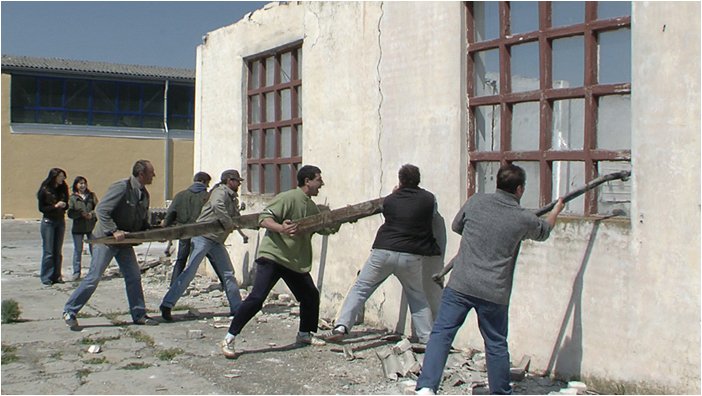The Old School of Capitalism,from Zelimir Zilnik, offers intriguing and progressive political commentary in a gritty but unfortunately one-note narrative.
The Old School of Capitalism opens in 2009 with Serbian workers marching in the streets of Belgrade, furious at the abysmal conditions caused by the country’s shift to capitalism. We’re immediately thrown into the crowd, seeing everything through a gritty digital camera. We hear bits and pieces of arguments happening in the demonstration, workers from varying backgrounds that have all come in their shared interest of living wages and social safety nets. We hear an older socialist engage in conversation with a younger capitalist, how their experiences have shaped their worldview and the ways they differ in their approach for worker’ rights. From this setup, director Zelimir Zilnik crafts an intriguing yet one-note narrative about workers’ rights, the failures of capitalism, and the ways those in power crush hopeful revolutions.
From the opening of the film, we are then presented with fictionalized scenes that are intercut with the documentary footage of the Belgrade demonstration, with real people from the protest seemingly playing versions of themselves in the fictional parts. The fictional narrative follows a group of workers as they revolt against their boss. At first the boss is nowhere to be found, but he eventually appears out of hiding with several bodyguards, antagonizing the workers and leading to a violent confrontation.
The narrative splinters off from here, following the workers as they decide their course of action, eventually accepting help from a group of empathetic anarchists to kidnap their boss and his compatriots. Meanwhile, their boss attempts to hide with allies, one of whom has powerful ties to the Russians. Zilnik portrays the ruthlessness of the boss and shareholders as they lie, cheat, and murder to maintain power and control over the workers, but also presents the actions the workers take as morally gray.

The entirety of The Old School of Capitalism is shot with a grungy digital camera, making everything appear as if it’s a documentary, even the fictionalized storyline. Furthermore, the dialogue of the fictional narrative seems largely improvised by the cast of nonprofessional actors, resulting in a chaotic but realistic presentation of events. However, one can often tell that the cast is nonprofessional, as some of the performances seem lacking in emotional vigor. Some actors seem to be trying too hard to avoid looking in the camera. The dialogue, while intriguing in how politically charged it is, ends up becoming exhausting over the two-hour runtime. People are constantly yelling and shouting over each other, resulting in the film feeling monotonous. The intercutting between documentary footage of real worker’s protests and the fictionalized narrative also makes the pacing feel sluggish throughout, as whatever narrative drive there was becomes undermined by the sudden shift to mostly unrelated footage.
While The Old School of Capitalism is commendable for its progressive politics and interesting blend of fact and fiction, it culminates in what feels more like a thought experiment than a film. Zilnik imagines what a possible worker’s revolt might look like, but without much narrative urgency and the film ends up being consumed by exhausting political arguments. While it works as an unconventional documentary-esque narrative, there are few standout characters the audience can connect with. Even though the portrait of the Serbian political realm is fascinating, and even though the film makes interesting connections with U.S. politics, The Old School of Capitalism ends up feeling one-note and difficult to engage with.
The Old School of Capitalism is currently streaming for free at Anthology Film Archives as part of their Anarchism on Film series, which runs until February 16th, 2021.

